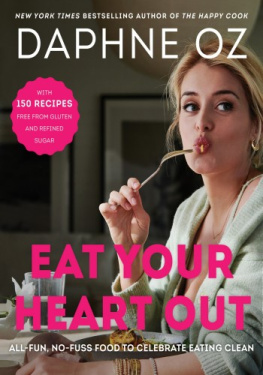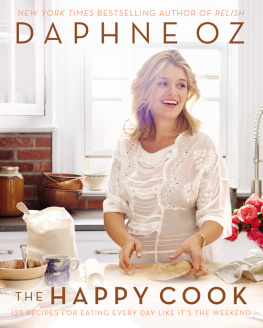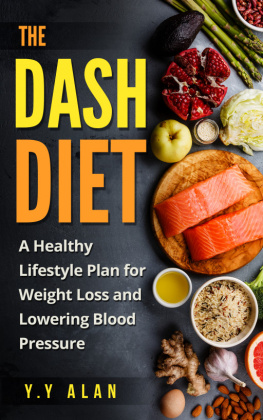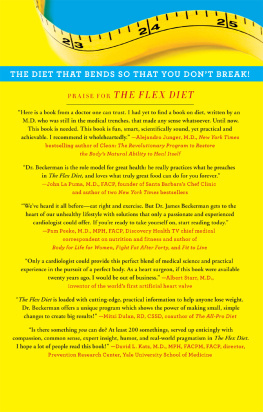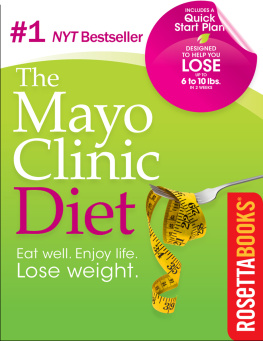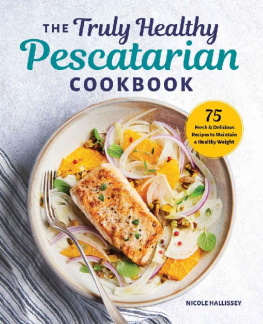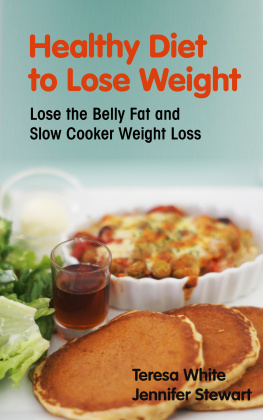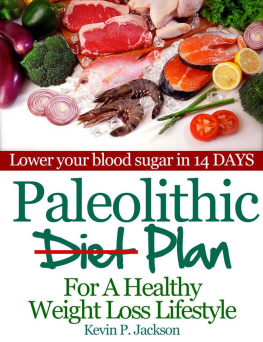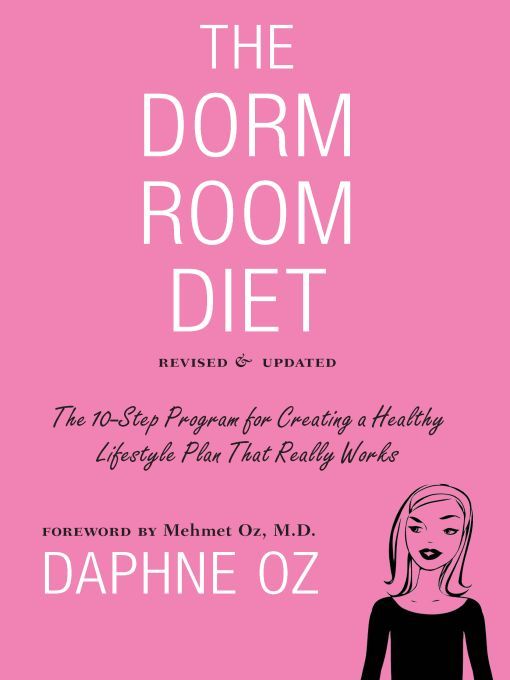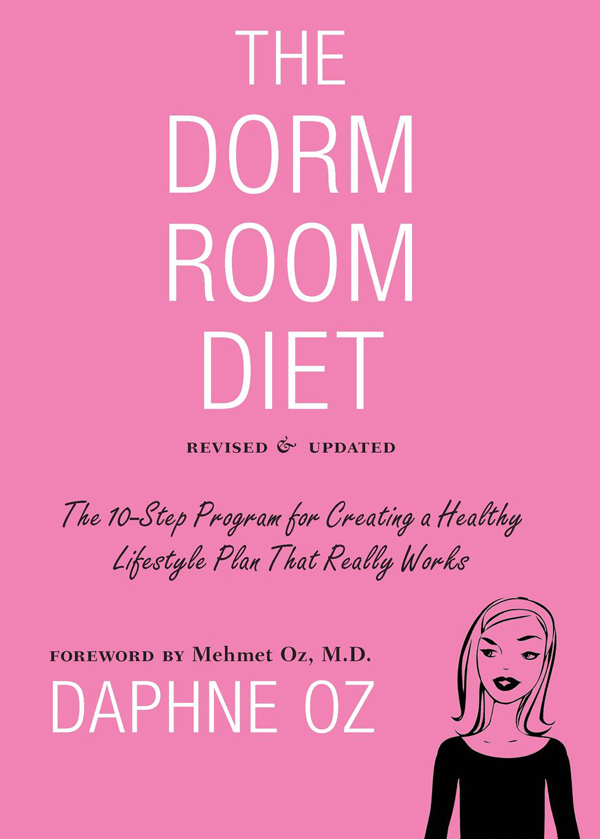Table of Contents
This book is designed to provide accurate and authoritative information regarding the subject matter covered. It is not intended as a substitute for medical advice from a qualified physician. The reader should consult his or her medical doctor, health adviser, or other competent professional before adopting any of the suggestions in this book or drawing inferences from them. The author and publisher specifically disclaim all responsibility for any liability, loss, or risk, personal or otherwise, that is incurred as a consequence, directly or indirectly, of the use and application of any of the contents of this book.
For my parents, Mehmet and Lisa
My sisters, Arabella and Zoe
And my brother, Oliver
BY Mehmet Oz, M.D.
FOUR YEARS AGO, when my eldest daughter, Daphne, first published The Dorm Room Diet, I remember asking how she felt the members of her generation could take better care of themselves. We dont need more information, she told me. We need more relatable teachers. Her vision was to help meet this need by becoming the go-to girl for how to live healthilyand happilyfor a young, busy, independent, conscious consumer.
With her first book, Daphne hoped to make the prospect of learning to eat, exercise, and supplement healthfully while living on a college campus not only possible, but fun. In this revised and expanded edition of The Dorm Room Diet, she takes readers one step further along the journey to health with a new focus on conscious living: seeing the relationship between food and health and personal choice on a global level. In the fight for health in America, engaging each of us to harness our consumer power for good is the next frontier. Im a heart surgeon and a talk show host. Today, I am fortunate to get to speak to so many proactive Americans, eager to become experts on how to best care for themselves. But I spent the better part of my career face-to-face with an open chest full of rusted arteries and rotted organs, created by a lifetime of poor health habits. My colleagues and I began to see younger and younger patients as a generation that grew up with tremendous opportunity for indulgence began to suffer from the lack of practical advice on pursuing a healthy lifestyle.
Despite their unprecedented access to information, the young men and woman on my operating table had not been able to create a lifestyle that would have preserved the health they had as children and teenagers. Sometime between the sandbox and their first apartment, these folks had missed the health boat. What Daphne realized was that college presents the perfect opportunity to forge health-promoting habits because it combines responsibility and freedom with peer-to-peer learning. But she also knew that she was up against some tough competition: namely, beer and pizza (and Xbox 360). Theres a reason we hear so much about the dreaded Freshman 15, after all.
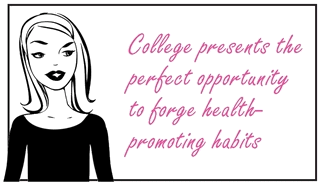
It starts with an extra cookie here and there, and then maybe the Sunday doughnut turns into the Sunday/Monday/twice-on-Saturday doughnut. A few more snacks, an extra scoop of soft serve, three slices of pizza instead of two. In college, studying hard (and perhaps socializing even harder) means you skip the gym and skimp on eating right. And by the time American Idol comes on, youd rather flop on the couch than flip off the TV. Eventually, the only part of your body thats getting any exercise is your right thumb. (In my day, there wasnt any running involved in keg races.)
Soon, your clothes are too small and your belly is too big. And then one daymaybe its a look in the mirror, or a picture of you wearing a bathing suit on spring break, or spotting all the buttons that have plummeted to their closet-floor gravesyou realize youre built like a Monday night cafeteria special: all mush.
Without question, this is the single biggest health threat in our country: were fat. Were a country of big portions, supersizing and deep-frying, and our clothes now have more Xs on the label than an adult video. In fact, the adolescent obesity rate has more than doubled since I was a kid, thirty years ago. Many of these people suffer from loss of self-esteem, low energy, diminishing of their intellectual prowess, an increased incidence of wrinkles, and even difficulty achieving orgasm (yes, you read right). The sad truth is that some of them will end up on my operating room table, when it can be too late to undo a lifetime of poor choices.
The time to intervene is when youre youngjust as youre developing your own brand-new habits of eating, exercising, and purchasing. This is why advertisers focus intensely on fifteen- to thirty-year-olds. Whatever direction you start off in, youll most likely stay that course for the next fifty years. Not many people change detergents in the middle of their lives. Same goes for eating and living habits.
By educating young folks, we have an advantage. Kids translate knowledge into action incredibly fast. Adults dont. If it comes in the right format and from the right source, information takes on new life for the sponge-like minds of young people, and it quickly becomes a part of their vernacular. Even better, adolescents are the viral marketers of a society. If you learn healthy habits, youll share them with your siblings, parents, classmates, and eventually even your own kids. You are the trendsetters because you spread the awareness and create the demand. The hope is that you will use this incredible influence to help shift the health paradigm from my generationssupermarket shelves lined with white bread and Spamto a new reality of high-quality food at affordable prices, available to everyone.
So who is the right messenger to help you learn to make the right choices in your life and spread the word to others? Not me, not your parents, not even your teachers. Your best teachers are one another. You understand each other not only because you like the same music and movies, but you come from the same cultural cooking pot. You have similar concerns about our planet, and youre savvy about the impact our daily decisions can make. Most importantly, you share the same challenges to keeping the most precious inheritance anyone can have, your body, working in high gearchallenges such as busy schedules, fat-infused dorm food, irregular sleep patterns, and a priority list on which eating right rarely makes an appearance.
My daughter Daphne is a recent college graduate who is now navigating independent life in her first apartment and a whole new slew of challenges. But she continues to rely on the tips and tricks she developed as a college freshman when she realized how important it was to establish healthy habits that would last her a lifetime. Like you, she was worried about the difficulties of juggling healthy living with college fun. But she had a unique set of skills that let her create a manual that works, and has since struck a working balance, in school and beyond.
She has a probing, insightful mind. She has also had the advantage of a lifelong education on how to keep her body and brain honed and toned. From me she has amassed the well-researched, scientific information about healthy living. From her mother she has learned how to live on a healthy vegetarian diet. From her grandmother, a nutritional adviser, she has garnered a wealth of information about the proper use of supplements. But even with this extra boost of lifestyle education, Daphne traveled a rough road on the journey to eating and exercising right. Once she found a plan that worked for her, she put all this information together for the benefit of readers her own age, in the magazine language she honed as a writer for


